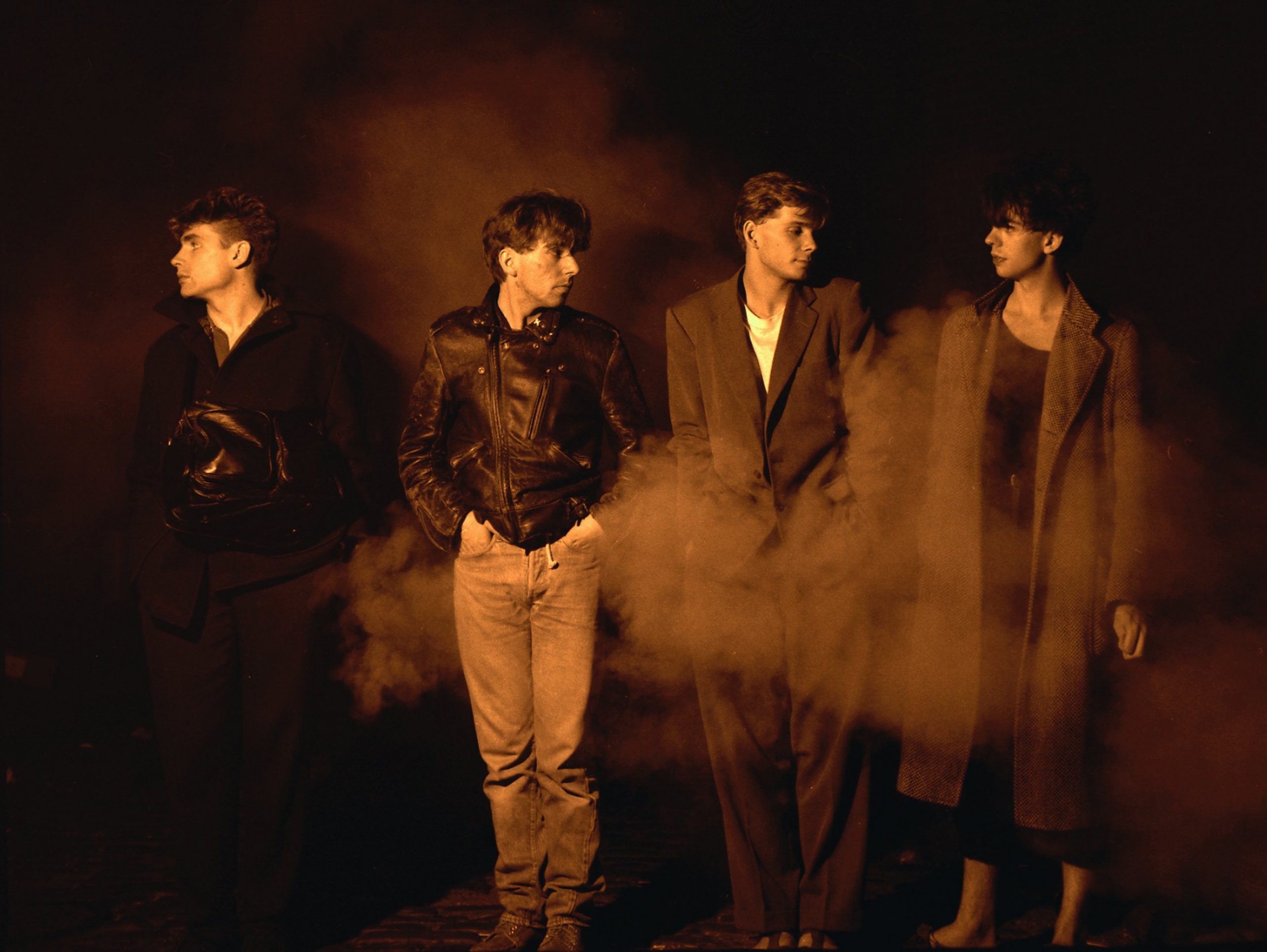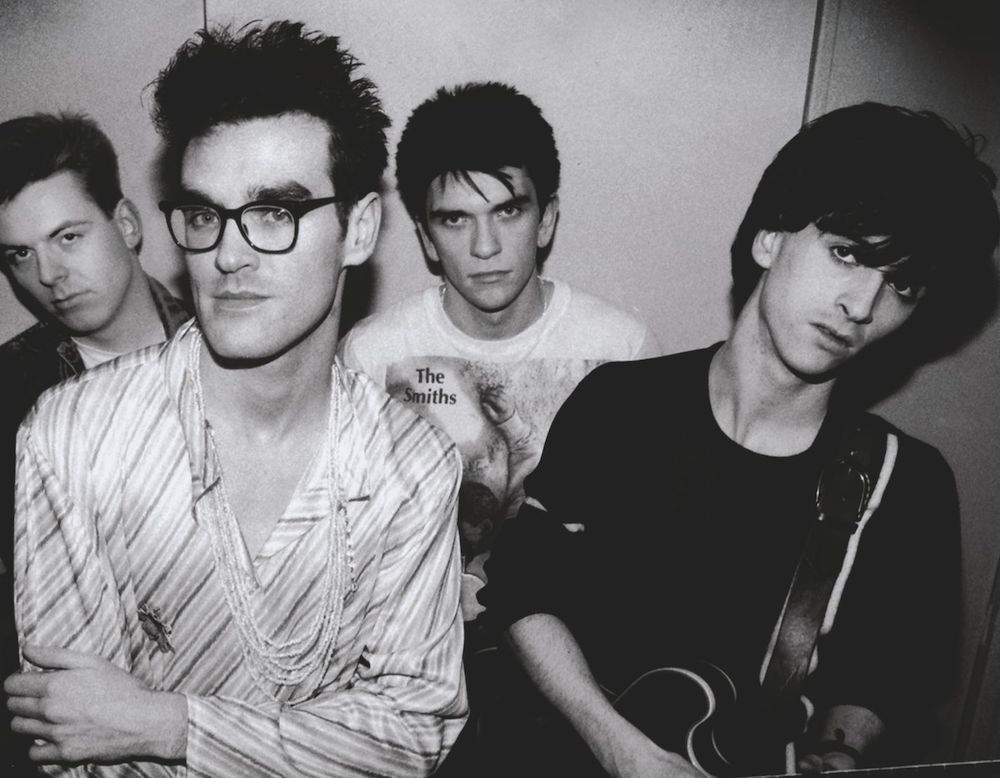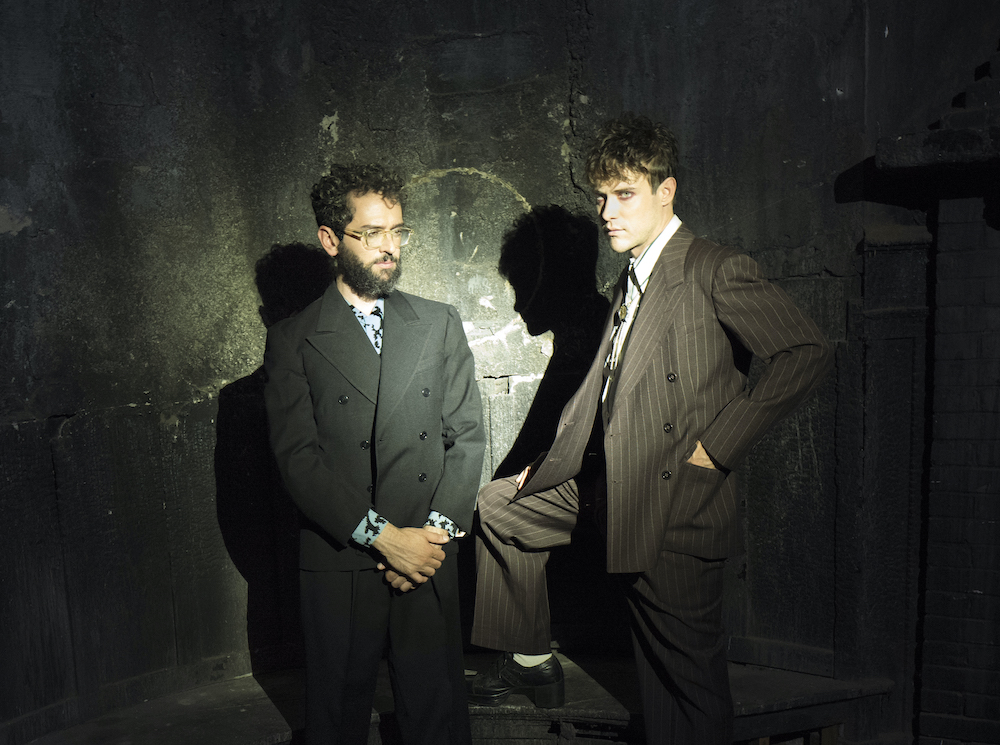The Beatles didn't live there anymore. Liverpool at the end of the '70s was hardscrabble and hardly swinging, but from its post-punk bohemia came a music scene tye-dyed by psychedelia and other '60s influences. Of all its visionaries, none grew so mighty in the '80s as Echo And The Bunnymen.
Beyond the riddle of the band's name lies a body of work that sparkles even 30 years after the end of their original run, a catalog full of encounters with mystery, prophecy, romance, and the sublime. They were a group of four: Les Pattinson on bass, Peter de Freitas on drums, Will Sergeant on guitar, and Ian McCulloch as singer and rhythm guitarist. Nobody was Echo, as sure as none of the Smiths was named Smith and Steely Dan was a dildo.
"Possibly more than any other thing, the Velvet Underground are important to Echo And The Bunnymen," McCulloch told a journalist in 1984. "The capacity for writing something like 'Pale Blue Eyes' and yet being able to write 'Sister Ray' as well." The Bunnymen excelled with similar versatility. Clamor and delicacy sat side by side as McCulloch struggled to find his bearings in the turbulence of coming of age. They were "always up and down" ("The Yo-Yo Man"), "going up, going down" ("Going Up"), counseled alternately by "angels and devils" ("Angels And Devils"), hostage to "laughter and crying" ("All My Life"), consumed by the eternal contest described in their most famous song, "The Killing Moon," as "fate up against your will."
Musically, they were among the decade's canniest students of '60s rock, using what they learned from the Velvets, the Doors, Leonard Cohen, the Beatles, and others to bring light and heat to the cold, dark territory of British post-punk. They carried something of the 19th century around too, in McCulloch's poetical lyrics and on so many record sleeves that pictured them outdoors amid dramatic scenery, like long-coated detectives on the trail of Friedrich's Wanderer Above The Sea Of Fog. Romantic but not New Romantic, gothic but never goth, the Bunnymen cut a special path from the basement clubs of Liverpool to the bedroom walls of midwestern American teenagers.
During the years of Margaret Thatcher's administration, with its especially punitive consequences for Liverpool, the Bunnymen showed little interest in politics. A thoroughly hetero, beer-drinking, meat-eating group of working-class young men, they weren't as transgressive or style-setting as even many of their pale, Northern English peers. (McCulloch comfortably inhabited his androgynous beauty, like David Bowie and Marc Bolan before him, and like those working-class heroes spent the biggest years of his fame married to a woman.) Accustomed to the gutter, the Bunnymen fixed their eyes on the stars; there was no grand project besides the passé aspiration to be great. "I only ever wanted, since the age of 13, to be the best singer of the best band in the world," McCulloch told SPIN in 2008. "The Kanye West of the '80s." On more than a few days during the middle years of that decade, he had to have been.
McCulloch couldn't have done it without the rest of them, nor they without him. They made 16 singles and five albums together -- Crocodiles (1980), Heaven Up Here (1981), Porcupine (1983), their masterpiece Ocean Rain (1984), and Echo And The Bunnymen (1987), plus a greatest hits, Songs To Learn And Sing (1985) -- before McCulloch left to pursue a solo career in 1988. The remaining Bunnymen pressed on with a replacement, and another, sadly, for de Freitas, who died following a motorcycle accident in 1989. The resulting album, 1990's Reverberation, had impossible prospects given what came before; comparisons with the Velvet Underground's Lou Reed-less Squeeze were preordained. The band took on water with the release of each single before finally floundering in early 1993. After a three-year hiatus, they reformed with McCulloch, and have since released six albums -- more music than they ever recorded in the '80s.
Conventionally and perhaps shortsightedly, this list privileges the work of the Bunnymen as they were when the world came to know them. Since 1987, there have been luminous moments, and much evidence of dignity preserved where others have squandered it, but that may be the subject of a future list; there's simply nothing to compare with the jewelry boxes of those first five albums. Despite how easy it's always been, especially here in America, to pass them over as another '80s bauble with a silly name, Echo And The Bunnymen made music to last. These really are songs to learn and sing.
10. "The Game" (from Echo And The Bunnymen, 1987)
"A sense of duty was my one intention/ and an ugly beauty was my own invention." Suppress your giggles and stay with this one. The first single and track from the Bunnymen's self-titled "gray album" of summer 1987, "The Game" was a long time coming. Three years had passed since the advent of Ocean Rain, with only one single, "Bring On The Dancing Horses," to break the interim in 1985. What did they have up their long dark coat sleeves, after the cathartic obliteration of the last album's finale? (That boat on the cover of Ocean Rain? They needed a bigger one.)
The stakes were high, and "The Game" is such a blithe-ass place to have gone. They had never sounded so at ease in the world -- or unambitious, but all their gauntlet-throwing to the charts was behind them. There are no tricks or challenges here, just honed craftsmanship on display; all seasoned, not one Bunnyman had yet reached age 30. They had been playing together for almost 10 years.
"The Game" also exemplifies a certain quality in McCulloch's songwriting that was present from the beginning and always good for a chuckle. No matter how great his inheritance from the Pre-Raphaelites, he was perfectly capable, on occasion, of pooping out inane verse and wrapping it in the band's music in the confidence that the song would float. And this one does, but be aware that combinations of English words are in play here like, "Everybody's got their own good reason/ why their favorite season is their favorite season," and "The earth is a world/ a world is a ball/ a ball in a game/ with no rules at all."
9. "Heaven Up Here" (from Heaven Up Here, 1981)
Heaven Up Here, the Bunnymen's second album, is an eerie, groovy, at times harrowing set that "proved we were going into uncharted territory, where no band of the time could even contemplate going," McCulloch boasted years later (and there's a lot more where that came from). The leap in sophistication was undeniable, and if they had disbanded after this one -- or, frankly, if McCulloch had died, as Ian Curtis had a year earlier -- who knows how much higher its critical reputation might stand today. As it happens, many of us are left regarding Heaven Up Here from a safe distance, like it's a pool whose surface might reveal something we don't especially want to glimpse. (Courtney Love, who, of all people, spent a season in Liverpool among the Bunnymen during her itinerant teenage years, ranked Heaven Up Here her favorite album of all time when asked by a reporter in 1995. Above Nevermind. Why not?)
Crashing, shrieking, with imagery of monstrous drunkenness, hallucinations, and soul-selling, the title track occupies a space to be avoided. The almost Stooges-like weight being thrown around is irresistible, though, and so much heavier than anything else they recorded. "I'd have given forever for a few good years," McCulloch says. Thankfully he didn't; he's nearing 60 and still touring.
https://youtube.com/watch?v=Ln5zov0PfWA
8. "Angels And Devils" (from the "Silver" single, 1984)
Some '80s guitar bands shed the most blatant traces of their '60s influences like vestigial organs after the first few records (R.E.M.'s Peter Buck de-jangled his chords, for instance), but the Bunnymen seemed to grow into their inspirations -- especially the Doors. It got to be like fawning, actually; in 1987 alone, they cut versions of "Soul Kitchen" and "People Are Strange" (for The Lost Boys soundtrack), and brought Doors keyboardist Ray Manzarek in for a single, "Bedbugs And Ballyhoo," that sounded no less toadyish than if they had just covered "Peace Frog" and been done with it.
"I honestly prefer Abba to the Doors," McCulloch told a reporter in 1984, the year the group recorded "Angels And Devils" as the B-side to "Silver" from Ocean Rain. His wiseass mouth might have been saying Benny, Agnetha, Frida, and Bjorn, but his lungs were channeling Jim Morrison all the while.
"Angels And Devils" is a sheer flaunting of the Bunnymen's fluency in the '60s idiom, a demonstration of their ability to not only emulate the Doors and, in this case, the Velvet Underground, but to reconstitute that music into something totally compelling as an original composition with integrity in its own right. Maybe they did it to hear themselves do it. Locked in a Velvets-y groove that's impeccably tight and unrushed, all fat bass and Moe Tucker toms, it's derivative in a way that somehow ends up sounding more like a tribute to themselves than any other group. Had they already heard VU, 10 tracks from the "lost" Velvets album released by Verve in 1984 and '85, or were they just that simpatico? Listen to the timbre of McCulloch's first words ("Call it a day/ when night becomes a mad escape") and you'd swear Jimbo himself had wandered into Warhol's Factory, silver balloons stirring from the vibrated air around the amps. Not a dream, though. Just an echo.
7. "Do It Clean" (from Crocodiles, 1980)
The biggest jam of the Bunnymen's early catalog, "Do It Clean" is party music, pure and simple. Who among their gloomy contemporaries was having this much fun in 1980? Sure as hell not Joy Division on Closer. Not the Cure, Bauhaus, or Killing Joke. Appended to their debut album after the fact and never released as a single, "Do It Clean" added up to nothing commercially but proved the Bunnymen could work just as well in heat as in cold, presaging floor-fillers like "Never Stop" and the feverish tempos of songs like "The Back Of Love." They never got sloppy. (They did get fuzzy, though, once: The B-side "Over Your Shoulder," from 1985, is unmistakably them, but fold one earlobe over a canal, if you can, and it could be the Jesus And Mary Chain.)
https://youtube.com/watch?v=Upf9ZAn-3Nw
6. "Never Stop (Discotheque)" (12" single, 1983)
"Never Stop," and specifically the extended and remixed "Discotheque" version, is the furthest the Bunnymen ever cared to venture onto the dance floor. But my did they throw down for this one. Less credit may be due to the band than David Balfe, who mixed the club version, and Hugh Jones, who produced the original (one in a portfolio of other big-chorus indie anthems from the era that includes Modern English's "I Melt With You," The Icicle Works' "Birds Fly (Whisper To A Scream)," and Kitchens Of Distinction's "Drive That Fast"). Actually, the Bunnymen benefitted from strong crews behind the boards across all five of their original albums. In such command of their own talent by this point, they rarely sounded overwhelmed.
Listen to how crisp and uncluttered the first minute is here, despite all the moving parts (xylophone, cello, conga, etc.), the analog and electronic instruments married so neatly. Then, when the curtain draws, McCulloch offers his slyest opening line: "Good God, you said/ Is that the only thing you care about?" What follows is the sound of a hammer never missing its nail, the delivery of the words so rightly calibrated to sustain the intensity of what the band and the producers are up to. Released dead in the middle of the Bunnymen's '80s career, with Ocean Rain not far away, "Never Stop" found them approaching the height of their powers.
5. "Seven Seas" (from Ocean Rain, 1984)
Word has it the Bunnymen's record company fought tooth and nail against paying for the Anton Corbijn-directed video for "Seven Seas," afraid its levity would compromise the band's image as the Dark Romantic Serious Men Of Indie. The song itself, jolly and dreamy, proved they were otherwise; the Bunnymen of Ocean Rain were plenty passionate, but on songs like "Crystal Days," "Silver," "My Kingdom," and this one, the dread and nervous energy of earlier work had been replaced by a new receptiveness to experience -- "a longing for some fresher feeling," as McCulloch says here. "Seven Seas" is the great restorative of their catalog, figuring the ocean as a place of healing and embrace rather than loneliness and peril. "Paint the whole world blue/ and stop your tears from stinging," as advice, could be what a lot of us need to hear. And the vision of McCulloch in startlingly persuasive drag could have been just what some of us, in the sexual malleability of adolescence, needed to see; that, too, was a fresher feeling.
4. "The Cutter" (from Porcupine, 1983)
From Porcupine, sinuous and piercing from start to finish, "The Cutter" is the sharpest quill of them all. It builds with the tautness that had become the Bunnymen's calling card, with famed session musician L. Shankar's modulated violin zigzagging over the chorus to give the song what's called its "Eastern" character. (The band would approach the palette of Indian music again, for a plodding, sitar-driven stab at "All You Need Is Love," and later on Reverberation. That time, at least, they paid professional Indian musicians.) The crucial moment of "The Cutter" comes right on the tail of the second chorus, around the 1:40 mark, when the Bunnymen leave one tier of impressive behind for an astral plane of goddamned majesty. It's a whole other chorus, it's a bridge, it's a bird, it's a plane -- however that supernova of "The Cutter" ought to be classified, it's a true event. When the song goes there again, at the 2:50 mark, the power behind McCulloch's voice is incredible, almost operatic. During a performance on Top Of The Pops, those moments physically transform McCulloch: The first time, he takes his coat off to reveal a naked shoulder, but on the second he pulls the other side of his shirt down to make what looks like a strapless dress, feminizing himself into a diva in time with the song's swelling passion. To anyone who heard the first two albums and supposed the Bunnymen would never amount to much, "The Cutter" should have been devastating -- like the band had taken a second hand out from behind its back.
https://youtube.com/watch?v=Y2ItNtCMgqc
3. "Ocean Rain" (from Ocean Rain, 1984)
Like a few of the best Bunnymen songs, "Ocean Rain" builds to a moment of dramatic, unexpected escalation, characterized here as elsewhere by a cloud-parting intervention from the reserve power of McCulloch's voice. It would be wrong to mention the exact minute mark of the turn; "Ocean Rain" really has to be heard from the beginning straight through. You may find it useful to lay down in a dark room, eyes closed and deprived of all sensory information beyond the gentle ballast of upright bass, brushed snares, violins, and one of Sergeant's most understated and inspired accompaniments. The last song on their most celebrated album, it's a singular performance by a group fully aware of the scale of their accomplishment. Down was the only place they could go, "screaming from the beneath the waves," but "Ocean Rain" is no horror story. It resolved their darkness, washed everything clean. After this, the sun came out for good.
2. "Bring On The Dancing Horses" (from the Songs To Learn & Sing compilation, 1985)
A curious motif runs through the Bunnymen that must spring from some deeper well of experience than rock 'n' roll: their affinity with the natural world, and especially animals. It's there in the elemental staging of the first four album covers (forest, beach, glacier, primeval watery cave). Wild creatures abound: monkeys; crocodiles; porcupines; the literal flock of seagulls on the cover of Heaven Up Here; Sergeant and Pattinson dressed as a fish and a penguin, respectively, in the "Seven Seas" video, as McCulloch describes "kissing the tortoise shell" during his undersea communion. If all this were a dog, it would have bit you. And then there's the mythological cast of the band's name, of course, and the totemic outline of a man-bunny on the covers of the first two singles. It's all a bit cultish and pagan, and belongs not just to their lyrical and visual vocabularies but to the music as well. (The ritual-sacrifice vibe of "All My Colours" is the most striking example, but damn, even "The Killing Moon" suggests the fearsome, alluring supernatural power of that governor of animal spirits, not to mention the giant bunny that lives up there. Maybe it was something in the Mersey; Stone Age Britain became a sonic and even scholarly preoccupation of Julian Cope, McCulloch's bandmate in the Liverpool punk scene who went on to lead Bunnymen contemporaries/scene rivals the Teardrop Explodes.) Were they transposing Jim Morrison's interest in mysticism and Native American religion to the UK?
This is all to say that "Bring On The Dancing Horses" is not so absurdly titled as it may seem. Do the lyrics make any sense? Absolutely not, but as a big, richly processed pop song, "Horses" endures like nothing else they recorded. In retrospect it summarizes what the band sounded like in maturity, and at the time of its release, about a year after Ocean Rain, it set the tone for the rest of their '80s output to sound slicker, as if commissioned for John Hughes movies. "Horses" was, in fact, but the Psychedelic Furs took home the big licensing check for Pretty In Pink. The film called Bring On The Dancing Horses, about a self-effacing, lower middle-class dressage competitor from the Chicago suburbs who falls for a prominent breeder's son despite the unrequited efforts of her best friend and stable-hand, sadly remains among the decade's great unmade pictures.
1. "The Killing Moon" (from Ocean Rain, 1984)
In the final accounting, there is everything else and then there is "The Killing Moon," a song for all time.
Inspired by a divine or at least subconscious missive, "Space Oddity" played backwards, and a visit to an obscure agricultural museum in Russia, it came together as something far grander than the sum of its peculiar parts. There's so much to take in and be taken in by: that indelible, ominous intro line; the double-tracked cello and the decade's finest balalaika-derived solo; the squalls of reverse-reverbed autoharp in the choruses, followed by little showers of pizzicato strings; McCulloch's choice of the word cancel. Sinatra might have covered it; McCulloch is on record wishing he had. (Instead, Pavement gave it a go, their fingernails a little too dirty, not quite rising to the occasion of the source material's unironic majesty.)
Years from now, when the horrible decade of the 1980s lies as far from living memory as the days of horse-drawn cabs and gas lamps, a generation of superior, agendered romantics may yet give themselves to this record. It can't have all been the arms race and the drug war and "Cherry Pie" by Warrant, they'll say, beneath a "sky all hung with jewels" like this one.






